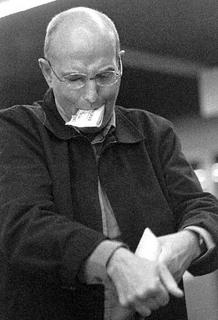 Eyewear is pleased to welcome Peter Finch (pictured) this first Friday of the new year.
Eyewear is pleased to welcome Peter Finch (pictured) this first Friday of the new year.Finch is, to my mind, one of the most significant (and witty and experimental) Welsh poets of the second half of the 20th century, into this the 21st. He is also a key cultural activist: organizing, editing, publishing and writing about, poetry - in its many guises.
He is a superb performer of his work, as I've witnessed on several occasions, once in Hungary on a very humid summer day that felt like Alabama, then again in Cardiff, which was much colder, and at the London Life Lines launch, in 2006.
I've been happy to include his work in several of my anthologies, including In The Criminal's Cabinet. He is openly and optimistically aligned with poetry that both innovates and reaches out to audiences - in short, almost singlehandedly defining the kind of poet I thought represented the future development of the art, when I wrote about fusion poetry.
Club
When my father turned our house
into a club it cost ten and six to get
in. People were aghast. A few
got the wrong idea when
Joan invited a Caribbean
to play boogie in the upstairs
parlour. But they needn't have
shown concern. Uncle Jim used a huge
mallet to knock a tap into a beer
barrel, first I'd ever seen, while
Pop reluctantly showed them all
his desk full of two pole wire
and rolled-up string. Bored
by this adult fantasy I slid into
Miss Winton the lodger's room
where I tried on the contents of her
knickers drawer. I can tell you now there
was little excitement. They were old,
yellowed and large. I'd read somewhere
that this is what adults did to pass
the winter nights. No TV just darkness.
Such disappointment.
I've spent my life since in a struggle
with passion; what is it, where is it,
how does it go?
Joan and Jim I could
understand but Miss Winton?
God only knows.
poem by Peter Finch
Comments